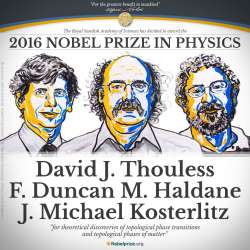British trio David Thouless, Duncan Haldane and Michael Kosterlitz win 2016 Nobel Prize in Physics
David Thouless, Duncan Haldane and Michael Kosterlitz, all three physicists from the United Kingdom, have won the prestigious Nobel Prize in Physics. The British-born scientists have been selected for work that "revealed the secrets

David Thouless, Duncan Haldane and Michael Kosterlitz, all three physicists from the United Kingdom, have won the prestigious Nobel Prize in Physics.
The British-born scientists have been selected for work that "revealed the secrets of exotic matter," the prize committee said on Tuesday.
The three "opened the door" to an unknown world where matter takes unusual states or phases, the Royal Swedish Academy of Sciences said.
They were selected for their "theoretical discoveries of topological phase transitions and topological phases of matter," the committee said.
Thouless, 82, is a professor emeritus at the University of Washington. Haldane, 65, is a physics professor at Princeton University in New Jersey. Kosterlitz, 73, is a physics professor at Brown University in Providence, Rhode Island.
Their research was conducted in the 1970s and '80s. Nobel judges often award discoveries made decades ago, to make sure they withstand the test of time.
This year's Nobel Prize announcements started Monday with the medicine award going to Japanese biologist Yoshinori Ohsumi for discoveries on autophagy, the process by which a cell breaks down and recycles content.
The chemistry prize will be announced on Wednesday and the Nobel Peace Prize on Friday. The economics and literature awards will be announced next week.
Each prize has a purse of 8 million kronor ($930,000). The winners also collect a medal and a diploma at the award ceremonies on Dec. 10, the anniversary of prize founder Alfred Nobel's death in 1896.
(With agency inputs)